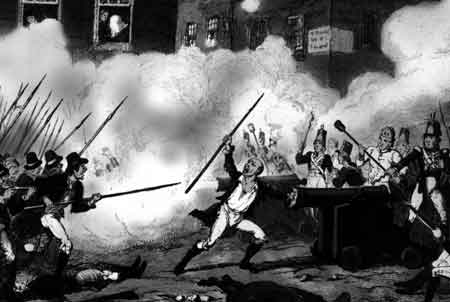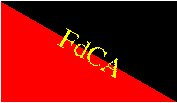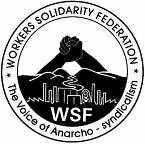Over 30 years of anarchist writing from Ireland listed under hundreds of topics
Magazine
The 1798 Rebellion
 In 1798 Ireland was shook by a mass rebellion for democratic rights and against British rule. 200 years later 1798 continues to loom over Irish politics. The bi-centenary, co-inciding with the 'Peace process', has attracted considerable discussion, with the formation of local history groups, the holding of conferences and a high level of interest in the TV documentaries and books published around the event.
In 1798 Ireland was shook by a mass rebellion for democratic rights and against British rule. 200 years later 1798 continues to loom over Irish politics. The bi-centenary, co-inciding with the 'Peace process', has attracted considerable discussion, with the formation of local history groups, the holding of conferences and a high level of interest in the TV documentaries and books published around the event.
Italian Anarchism...get back to where you once belonged

Italy is one of the historical strongholds of the anarchist movement. Donato Romito, the international secretary of the Italian Federation of Anarchist Communists (Fd.C.A), provides an overview of the anarchist movement in Italy today, the organisations and publications that comprise it and the direction it should take in the future.
Defeating the Water Tax in Dublin in the 1990s
 Last year, the domestic water charge was abolished. In 'Winning The Water War', Dermot Sreenan, an activist in the Federation of Dublin Anti Water Charges Campaigns examines the campaign and the demonstration of people power that brought about the downfall of this charge.
Last year, the domestic water charge was abolished. In 'Winning The Water War', Dermot Sreenan, an activist in the Federation of Dublin Anti Water Charges Campaigns examines the campaign and the demonstration of people power that brought about the downfall of this charge.
After Apartheid: Anarchism and the 'new' South Africa
 Just three years after the famous elections that ended apartheid in April 1994, South Africa's reforms are in crisis and dissatisfaction is rising. In a wide ranging interview we ask the Workers Solidarity Federation for their views on what has happened since the end of apartheid. Interview by Kevin Doyle.
Just three years after the famous elections that ended apartheid in April 1994, South Africa's reforms are in crisis and dissatisfaction is rising. In a wide ranging interview we ask the Workers Solidarity Federation for their views on what has happened since the end of apartheid. Interview by Kevin Doyle.
Anarchists and the trade unions - Be active - be involved
Trade Unions are important organs of the working-class. Gregor Kerr - a member of the Irish National Teachers Organisation who has been involved in campaigns against "social partnership" and in many strike support groups - argues that trade union involvement should form a central part of the political activity of all anarchists.
Which Way to the Revolution?
A complete transformation of society, revolution, is the goal of anarchism. Ray Cunningham looks at what is meant when anarchists talk about revolution, and what can be done to bring it closer.
From the 1870's the world has been rocked by revolutions, but all have gone down to defeat. Anarchists believe they understand why previous revolutions have failed, but do we know how a successful revolution can be made? Are there steps we can take today to prepare and nurture such a revolution, or is it a question of waiting for the ripening of time?
The Dunnes Strike & Managing Change - the two souls of the trade union
For three weeks, in June-July 1995, nearly 6,000 mostly young and part-time workers struck against Ireland's largest private sector employer, the firmly anti-union Dunnes Stores, over Sunday trading, zero-hours contracts, the proportion of full-time jobs and other issues. But the principal, and unstated, issues were probably union recognition and the organisation of the newly emergent semi-casual, part-time, young (and mainly female) section of the labour force. The result, while disappointing on the concrete 'economic' issues, was generally greeted as something of a breakthrough on the latter 'political' issues.
Union activists are facing new management attacks but the trade union leadership speaks only of partnership with the bosses. Des Derwin, member of the Executive of the Dublin Council of Trade Unions and of the Dublin Private Sector Regional Executive Committee of SIPTU gives his personal view on the two souls of the unions.
The history of Irish Travellers' struggle for civil rights and ethnic recognition
Patricia McCarthy examines the history of Irish Travellers' struggle for civil rights and ethnic recognition. Their struggles have much in common with those of Indigenous people worldwide and with the struggles of Native Americans and Australian Aboriginals and also with the struggles of Gypsies, Travellers and nomads against racism and oppression.
Noam Chomsky on Anarchism, Marxism & Hope for the Future - interview
 Noam Chomsky is widely known for his critique of U.S foreign policy, and for his work as a linguist. Less well known is his ongoing support for libertarian socialist objectives. In a special interview done for Red and Black Revolution, Chomsky gives his views on anarchism and marxism, and the prospects for socialism now. The interview was conducted in May 1995 by Kevin Doyle.
Noam Chomsky is widely known for his critique of U.S foreign policy, and for his work as a linguist. Less well known is his ongoing support for libertarian socialist objectives. In a special interview done for Red and Black Revolution, Chomsky gives his views on anarchism and marxism, and the prospects for socialism now. The interview was conducted in May 1995 by Kevin Doyle.
Sinn Fein and the 'Peace Process'
The 'Irish peace process' is now well into its second year. It has brought respectability for Sinn Féin but little of consequence for the Irish working class - North or South. Gregor Kerr a member of the National Committee of the Irish Anti Extradition Committee in the late 1980s, looks at events leading up to the cease-fire and Sinn Féin's pan-nationalist strategy.
Since the ending of the 'Cold War', many national liberation struggles throughout the world have been 'settled'. In places as far apart as South Africa, El Salvador, Nicaragua and Palestine these national liberation struggles were led by groupings which were often seen as having left leanings. However in all of these cases the 'settlement' was far from socialist. The current 'Irish peace process' is following exactly the same lines and has nothing to offer the Irish working class North or South

